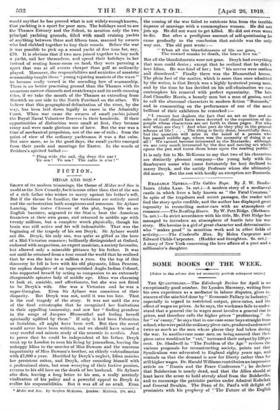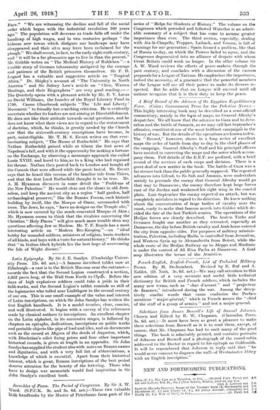SOME BOOKS OF THE WEEK.
/Notice in this column does not necessarily prelude tuboequent review.]
THE QUAHTSRLIBS.—The Edinburgh Review for April is an exceptionally good number. Sir Lynden Macassey, writing from his own experience as a mediator in labour disputes, gives in- stances of the mischief done by " Economic Fallacy in Industry," especially in regard to restricted output, piece-rates, and the effect of wages on prices. As he says, the workman fails to under- stand that a general rise in wages must involve a general rise in prices, and therefore calla the higher prices "profiteering." As for " ea' canny," he says that in one case some boys straight from school, who were paid the ordinary pie ee-rate, produced and earned twice as much as the men whose places they had taken during the war. In another case some men, on being assured that their piece-rates would not be "cut," increased their output by 120 per cent. Dr. Shadwell in " The Problem of the Age " reviews the various proposals for reconstructing society, points out that Syndicalism was advocated in England eighty years ago, and reminds us that the demand is now for liberty rather than for still higher wages. Dr. Harold Williams contributes an impressive article on " Russia and the Peace Conference" ; he declares that Bolshevism is nearly dead, and that the Allies should at least have the sense to hold sternly aloof from the Bolsheviks, and to encourage the patriotic parties under Admiral Holtchak and General Denikin. The Dean of St. Paul's will delight all pessimists with his prophecy of " The Future of the English Race." " We are witnessing the decline and fall of the social order which began with the industrial revolution 160 years ago " The population will decrease as trade falls off under the handicap of high wages, and in two centuries perhaps " the hideous new towns which disfigure our landscape may have disappeared and their sites may have been reclaimed for the plough." We shall revert, in fact, to the early eighteenth century, and " it will be a far pleasanter age to live in than the present." Mr. Gribble writes on "The Medical History of Ruhleben "—a terrible story of German inhumanity mitigated by the courage and patience of the British prisoners themselves. Sir F. D. Lugard has a valuable and suggestive article on " Tropical Africa." Dr. Shipley's account of " The University in North America" and Sir Sidney Low's article on Clive, Warren Hastings, and their Biographers" are very good reading.— The Quarterly opens with a pleasant article by Mr. E. V. Lucas on David Williams, the founder of the Royal Literary Fund in 1700. Canon Glazebrook subjects "The `Life and Liberty' Movement " to friendly but searching criticism. He is evidently uncertain whether its leaders are not aiming at Disestablishment. He does not like their attitude towards social questions, and he does not know what their views are in regard to the restatement of doctrine, which, he thinks, is greatly needed by the Church now that the sixteenth-century conceptions have become, in part, unintelligible. Mr. T. H. S. Eseott writes on that ever. fascinating subject, "The House of Rothschild." He says that Nathan Rothschild gained while at Ghent the first news of Napoleon's fall, and with it the opportunity for making a fortune on the Exchange, by observing a messenger approach the exiled Louis XVIII. and kneel to him, as to a King who had regained his throne. Nathan then posted back to London and bought all the Consols that were offered while the panic lasted. Mr. Escott says that he heard this version of the familiar tale from niers, and that the first Lord Rothschild thought it to be true. Mr. A. M. Hyamson discusses in some detail the " Problems of the New Palestine." He would clear out the slums in old Jeru- salem, and keep the ancient city as a region " half garden, half archaeological preserve," like the Roman Forum, each historic building by itself, like the Mosque of Omar, surrounded with trees. The Jews, he says, " have no designs on the Temple site," which is now covered by the mue.h.venerated Mosque el Aksa ; Mr. Hyamson seems to think that the rivalries concerning the Christian " Holy Places will give much more trouble than any questions affecting Jew or Moslem. Mr. T. F. Royds has a most interesting article on " Modern Bee-Keeping "—an " ideal hobby for wounded soldiers, ministers of religion, brain-workers of all kinds, and boys with a taste for natural history." He thinks that " in Italian-black hybrids lies the best hope of overcoming the Isle of Wight disease."







































 Previous page
Previous page